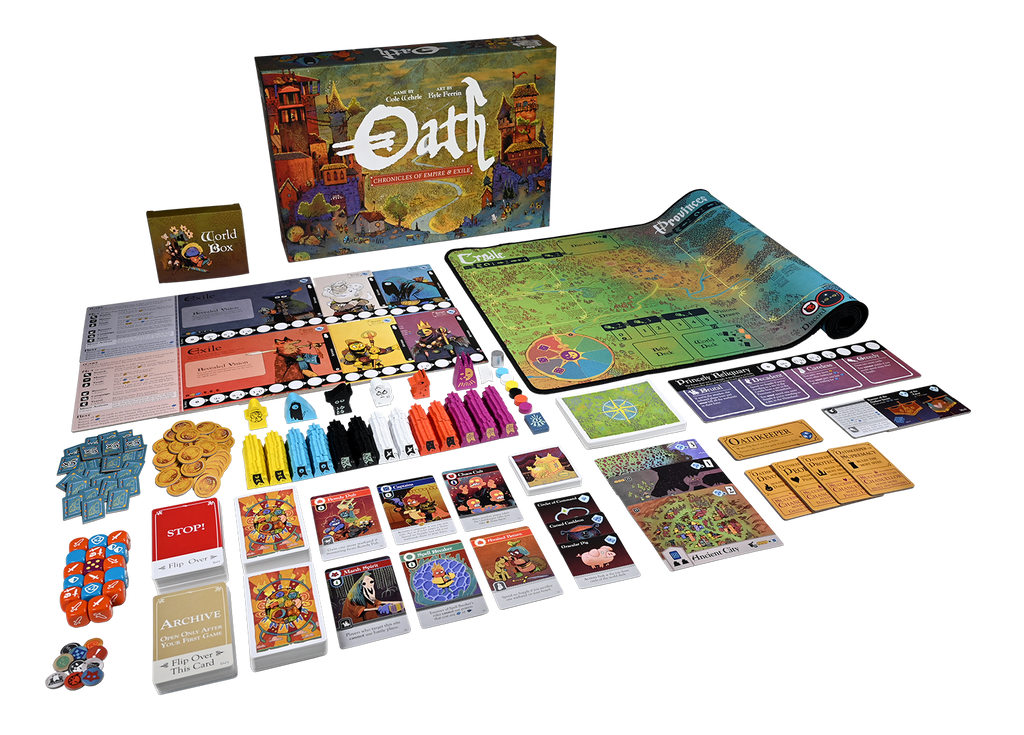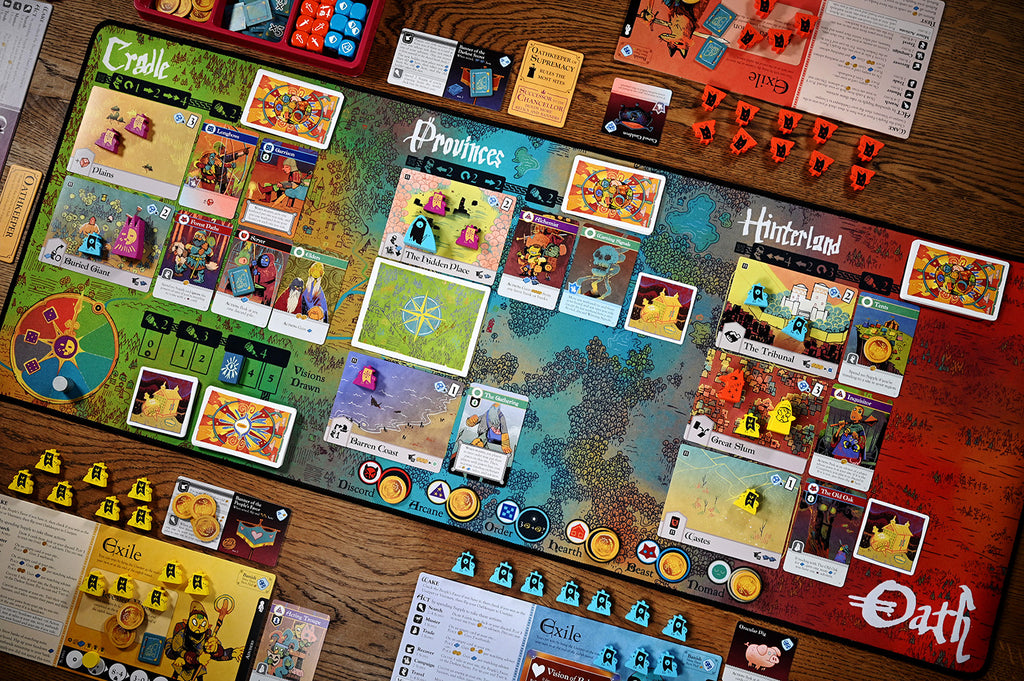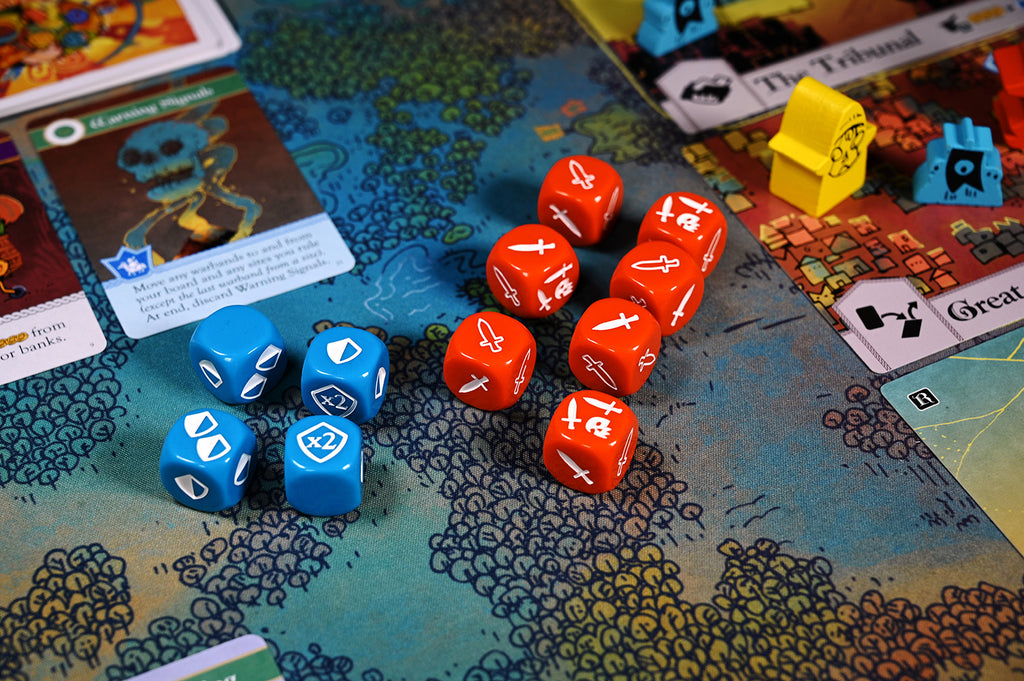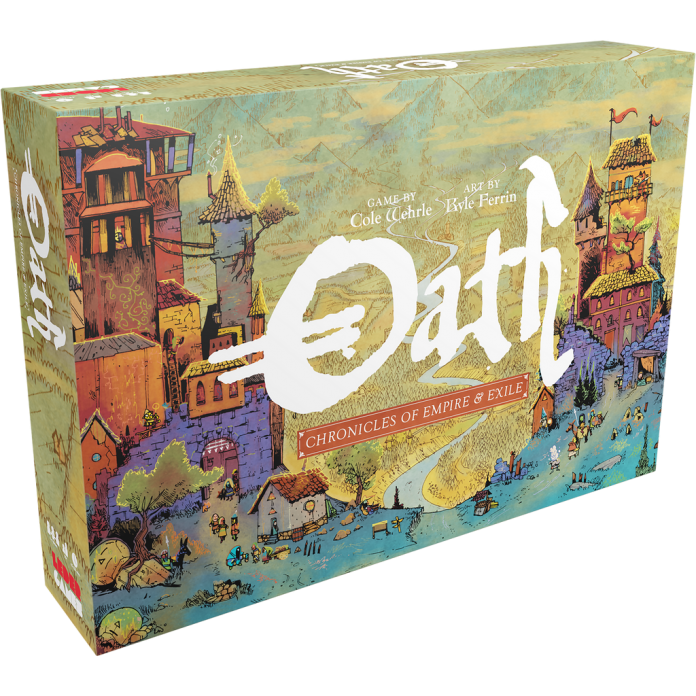Oath is the latest game from Cole Wehrle, a step away from the historical Pax Pamir or John Company and semi-adjacent to the woodland warfare of Root, an it is an absolutely inscrutable game to describe. Oath is not a legacy game, but it remembers what happened in the games you played before your current session. It is not a roleplaying game, but asks players to assume and play into the roles given to them. It is not a consim or coin game, but features insurgent forces trying to overthrow rulers, alliances made under and over the table, and yet victory can come specifically with both bangs or whimpers, and can leave your table scratching its head, licking its wounds, and breaking up friendships.
Oath is technically a game for 1-6 people, but it is worth noting that Solo and 2p play a very different game than 3 and 4 play, and 5 and 6 are similarly odd. That’s just part of the problem of describing Oath and recommending it–if you were to only ever play Solo or 2p, you should probably look elsewhere. 4-5? Good times can be found here if your table enjoys combative, sometimes mean spirited empire and world building. 3 or 6? Well…
Either way, players take on roles within the kingdom, with winning conditions being dependent on who you are, and even then, victory can be a little nebulous. The Chancellor likely wants to remain in power to ‘win’ the current game, but beyond that, winning and losing in oath is sometimes more determined by the set-up of the game than it is any specific, over-arching win condition like the most points or last person standing. Also, players may set personal goals to set up victory in the next game… or maybe just punch the person in last place while they’re down, because you aren’t winning either.
If any of that sounds like your thing, Oath might be the game to live on your table for months to come. If that sounds unattractive, Oath is a game you should stay far, far away from. Hopefully, our group review here can give you some insight on whether Oath could be your next favorite game, or a game you are better off avoiding!
Oath is complex. Rather than have 1 or all of our authors try to explain how it plays, check out this effective summary by BGG user Fox Trolio.:
Click to Read Game Structure

Kenji
Oath killed my board gaming group.
That isn’t even hyperbole. When the idea of a review copy of Oath was floated my way, I figured I had a group that was the perfect size: 4. Oath sings when 4 players are engaged, as the game is actually faster than it seems. There are not a lot of choices to be made per turn, and once the actions start flying, the game can truly build to an interesting crescendo and tells fun stories when done. I’ve seen people online post some fascinating drawings of their Oath ‘campaign’ (a misnomer, as there is no overarching story, just what comes out at the table).
For my group, though, Oath was torture. My group was notoriously conflict game averse in games with lots of ‘gotcha’, but would tolerate conflict because, well, games have to have winners. And so, we agreed to play Oath by having some specific agreements in place that we understood it was all a game, for review even.
Six months later, my group no longer speaks or plays with one another, because in our third game, one of the players, already in last place, got absolutely walloped for a relic they were holding by another player for, in their words, “I was bored.”
Oath can truly bring out monsters from your table. If your group is welcoming to conflict and bargaining, to alliances and backstabbing, and random acts of cruelty, then Oath may be a great time for you. I would always, always hazard that this game is best played with a dedicated group. While Oath does not require the commitment of a Legacy game in the normal sense, it requires your attention in a way that it develops as a ‘lifestyle’ game: basically, your group plays Oath, and nothing other than Oath that isn’t some sort of icebreaker game. The game takes a while, takes up huge real estate, and explaining how to play to new players can not only be time consuming but ultimately worthless. On a few occasions we tried to rope a 5th player in, but they found themselves constantly lost or taken advantage of, and having to add or remove things based on that constant fluctuating player was far more of a chore than it should have been.
That said, personally, I really enjoyed what Oath offered. I think in my memories of it, the game was a lot of fun and something unlike other games out there. There’s not as much freeform playing as you’d expect from what the game seems to advertise–the systems are less malleable and more inscrutable, meaning that your choices are limited but you just don’t understand how or why. A few of our games ended faster than expected because the ‘win’ condition just happened to make more sense to one player than the other, and was also easy to obtain on that play.

Mike BS
I’ve been playing Oath with a group of friends over the past few months using the excellent TTS version. If you’re still wary of meeting for games face to face, or your gaming group is somewhat remote, the TTS module is fantastic. It automates a decent amount for you, the assets look great and saving state and set up between sessions is incredibly helpful. My initial experiences with Oath were mixed at best and there were certain evenings where it even felt like a little bit of a drag. Lines of play were often confusing and it can be a little overwhelming at times, however it’s a game that’s designed to be replayed and things eventually started clicking for me.
More recently, I’ve been able to scheme was some success and planning a few turns ahead has started to make sense. In our most recent game I raised this with my group and it turned out I wasn’t alone in not always enjoying Oath, so I do wonder if there were some nights where it was inertia alone keeping us going.
After talking about it for a little while, what came out were the feel bad moments. Nothing sucks more than having a perfect plan and then someone deciding that actually it’s time for you to have your day ruined. You can go from being in a great position to win, to maybe being able to king maker if you’re lucky.
Our most recent game has had some huge dramatic moments in it and at one point or another every player has been in a position to potentially win. I’m genuinely looking forward to our next session where we’ll be wrapping it up as I’ve got myself set up to snatch victory from the jaws of defeat, assuming someone else doesn’t get there first.

Solo Mode
Ilor
I have only played a handful of games of Oath with other human beings, but those have all been teaching games. But I’ve played quite a bit of Oath solo, using the “Clockwork Prince” that is included with the game.
During a global pandemic, games that you can play solo have been a real treat, and Oath is no exception. The Clockwork Prince is a lot like the “bots” you get in the COIN games like Cuba Libre or A Distant Plain, where in order to make the game work all of the factions must be represented somehow. These games enable that by having a flow chart (of varying levels of complexity) that indicate what the bot “player” will do on its (or their) turn(s).
Oath uses a similar mechanic, with the actions of the Clockwork Prince governed by an interlocking flow chart that represents a series of decision points and strategies. At the beginning of the Prince’s turn, a card draw is going to set the tone for that turn, either creating a relationship with a new faction or strengthening an existing relationship with a faction. From there, depending on the win condition the Clockwork Prince will either seek to achieve the win condition directly, or (if it’s already winning) knock you into the dirt. For the most part it works well, but there are some gotchas to keep in mind.
First and foremost, while the actions the Clockwork Prince is taking are essentially the same as those of the players (apart from the initial draw), the conditions under which they occur is subtly different. For instance, the Clockwork Prince simply gets a certain number of actions per turn (variable based on that initial draw) and does not track Supply – and thus when Travelling it simply moves where it needs to go for free. This means that some of the nuance of the game’s “topography” (i.e. the opportunity cost of doing stuff in the Provinces or the remote Hinterlands) is lost – the Prince doesn’t care and such distances are really only punitive to the human player. You can’t hide out in the Hinterlands and burn the Prince’s Supply by making him chase you down to fight you or take your banners and relics. Similarly, trading works just differently enough that you have to think about it. And then there’s the stuff that’s hard to keep track of or remember, like the fact that card draws (either the initial draw or when the Prince is performing s Search action) that reveal a battle plan increase the Prince’s “tactics” rating (which essentially gives the Prince free dice in combat, something else that’s easy to forget). During the course of play, stuff like this can be easily overlooked, so it’s important to stay focused and be methodical.
Next, the Clockwork Prince cannot play a Vision, and if it is an Exile it cannot become a Citizen. This means that if it is playing as an Exile, it is laser-focused on the base win condition and you lose much of the unpredictability that Oath brings to the table with human opponents. If the Prince manages to grab the Oathkeeper title (or when playing as Chancellor, where it starts with it) its actions are much more varied, and it makes for a more interesting experience. For your first couple of times using the Clockwork Prince, I strongly suggest you let it play as the Chancellor.
Finally, because Secrets are a renewable resource that are not capped (unlike Favor, which gets spent and is a closed economy), any victory condition that requires the Clockwork Prince to generate Secrets will very quickly result in a truly sick number of Secrets in play. During one game in which the control of the Banner of the Darkest Secret was the oathkeeper condition, the banner had changed hands a number of times. I had a whopping 20 Secrets on it and had reduced the Clockwork Prince to only having 1 available (by having the perfect Denizen combo in play). By the end of its following turn, it had amassed a total of 19 Secrets. Had the game not ended (I was playing the Chancellor and got a lucky 5 when I needed it), the Clockwork Prince would have dumped a ridiculous 25+ Secrets on the banner when reclaiming in its following turn, which would have been virtually impossible for me to overtop. This is obviously less an issue with the Banner of the People’s Favor because of that resource’s closed economy, but it represents an issue with how Trading for the Clockwork Prince isn’t entirely balanced in all circumstances.
All that said, I have had some fantastic games against the Clockwork Prince. Most games are real back-and-forth nail-biters, which is great. Even though the Clockwork Prince essentially “cheats” by altering how it takes actions, the overall balance seems pretty well tuned (apart for the runaway Secrets issue). If you want to beat it, you’ll need to be clever and use your advisors, denizens, and sites wisely.
Ultimately, I ended up making a few tweaks to the Clockwork Prince to make it more interesting. In its native state, for instance, it rarely does any exploration or reveals new Sites. By allowing the Prince to move to and reveal a new Site to play its initial draw card when there are no open slots on the Sites already revealed, it got more interesting Site/Denizen combos into play. I also allowed it to be pretty aggressive in using its available powers (which was brutal the time it got its hands on the “Sticky Fire” Relic, which is as nasty as it sounds).
I also feel like there’s still room for improvement, especially as regards countering the human player’s build-up. Unlike human opponents (who will inevitably use the Roving Terror to obliterate the Forest Paths, cutting you off from the Old Oak out in the Hinterlands when you need it most – or some other similarly convoluted and dastardly thing), the Clockwork Prince has no mechanism to identify and dismantle Sites or Denizens (or combinations thereof) to prevent the human player from being as much of a threat. Even something as simple as taking a particular Site to prevent a player from using its Denizens from afar is generally lost on the Clockwork Prince.
I may tinker with it some more, but understand that that’s largely because I love to tinker – as-is it already offers an interesting and challenging game-play experience. And just like with a human play-group it allows you to explore the “chronicle” aspect of the game, with the World Deck changing over successive play-throughs and building up a narrative that spans games. My deck got very strongly Arcane, and there was a stretch of several games with the Clockwork Prince ruling as an iron-fisted sorceror-Chancellor from his throne in the Sunken City. I found my solo games producing internal stories that I had never planned, and that I think is one of Oath’s greatest strengths.
Wrap-Up
Hopefully, our review helps you out. Oath has certainly made the rounds by now, and a lot of the early impression reviews on the internet seemed fairly ambivalent. I will say that, well, ours is a bit too, but it’s also brought about by a collection of multiple play sessions over months. If you think Oath sounds like the type of game you’d like to take over your life, then you will be well served by what awaits you in that behemoth of a box. That said, if not, there are other games you might like… such as Root, but more on that later…!
All things considered, Oath is also fairly expensive. It is somewhat important to keep that in mind. Not only is Oath expensive, it requires a lot of table space, a dedicated 4-5 player group that will play it a lot, and most of your gaming session’s time. Oath asks a lot of you, and whether you answer the call or not falls into a prophecy only you and your players can answer.


